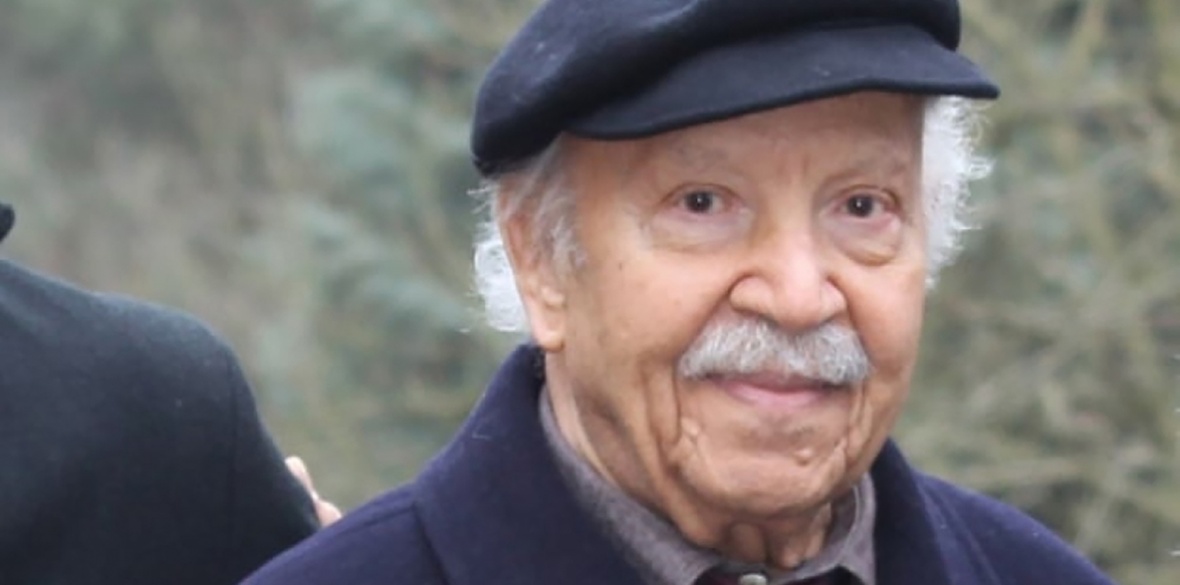This is the last article you can read this month
You can read more article this month
You can read more articles this month
Sorry your limit is up for this month
Reset on:
Please help support the Morning Star by subscribing here
ON March 19 2021, just three days before his 98th birthday, the first secretary of the Tudeh Party of Iran for the previous 37 years, Ali Khavari, suffered a cardiac arrest and died at home in Berlin.
With his passing the international communist movement lost one of its most remarkable and long-serving leaders.
Comrade Khavari selflessly dedicated the whole of his adult life to the party, the international struggle and the cause of socialism.
He gave everything he had in whatever circumstance he was placed — working underground for the outlawed party, serving time as a long-term political prisoner of the shah, Mohammad Reza Pahlavi, and in decades-long exile from the post-1979 theocratic dictatorship, from which he was never to return.
In an interview with Jung Welte in August 2009, Khavari said: “Every aspect of the political, social and cultural life of our diverse society is affected by [the] tireless struggle and effort of our party.”
The truth was that since the regime’s murderous attack on the party in early 1983, it was in large part due to Khavari’s leadership that this was possible.
Ali Khavari was born on March 22 1923 in Mashad, north-east Iran, at a time of rapid social and political change.
The bankrupt and corrupt Qajar dynasty was in the final stages of collapse in a mire of corruption and incompetence, amid the internal devastation and destitution created by the protagonists in World War I, including Britain.
Military officer, Reza Khan Pahlavi, had seized control of all armed forces and operations in the country in February 1921, a month before Khavari was born.
He became prime minister in 1923 and shah in 1925. But the struggle for rights and justice in Iran, together with the inspiration of the Great October Socialist Revolution in Russia in 1917, had provided the impetus for the spread of socialist ideas.
The Communist Party of Iran was founded in 1920 and one of Khavari’s older brothers became a member and greatly influenced his younger sibling.
It is of no surprise, therefore, to find 18-year-old Ali Khavari working with the Tudeh (Mass) Party, the successor of the now banned Communist Party, from its foundation on October 2 1941, applying his energy and already considerable talent to organisation of the party’s youth work.
In 2020, he told his comrades: “I was a young man deeply influenced by political ideas and I was active in Mashad.”
He was accorded full party membership in 1943, having persuaded comrades to allow this a few months before reaching his 21st birthday, prior to which young people would not normally be admitted.
In February 1949, the Tudeh Party was banned by the regime and Khavari, whose life was now in danger, left Iran and went into political exile in the Soviet Union shortly before the August 1953 CIA- and British-organised coup.
There he combined postgraduate studies with education in the theory and practice of Marxism-Leninism, proving himself a most able student.
From the USSR the Tudeh Party posted him to China where, in Beijing, he taught Persian and was involved in the operation of a Farsi language radio station.
The party leadership in exile then put supreme trust in Ali Khavari, recalling him from China in the early 1960s to develop and secure the running of its underground structures inside Iran.
His skill in both organisation and communication, his dependability and commitment, and his rare capacity to combine pursuit of strategic objectives with the detail of tactical planning made him ideal for this dangerous task.
He was, however, eventually betrayed, arrested by the secret police force, SAVAK, put on trial, incarcerated and tortured.
In court, he delivered an historic speech exposing and condemning the shah’s regime and in defence of the Tudeh Party and the aspirations, hopes and ideals of the Iranian masses.
His words showed total lack of concern for his individual fate and absolute dedication to the party and people, blame for whose poverty, hunger and neglect he placed unequivocally on the Pahlavi regime.
“You may be able to convict [me], but no-one can convict the truth, let alone sentence it to death,” he told his prosecutors.
The court condemned him to execution, but due to intense international pressure, the sentence was commuted to life imprisonment and he began his prison term in 1964.
Ali Khavari served 15 years, during which his unwavering compassion, courage and steadfastness earned him the respect of political prisoners from across the ideological spectrum.
He became a trusted influencer of younger prisoners and translated works from Russian to Farsi.
He was released immediately before the 1979 revolution and assigned a key role in the setting up and production of the party’s paper, Mardom, in Tehran.
In 1981, the party sent him to Prague to represent it on the editorial board of the international magazine Problems of Peace and Socialism (World Marxist Review).
He was thus out of Iran when the Tudeh leadership was arrested by the regime on February 6 1983 and the party was brutally suppressed. Khavari was the only party leader to remain alive and free.
His membership of the central committee of the party had been announced in the 1960s during his imprisonment.
On his release, at the 16th plenary of the party’s central committee, he was elected to its political committee and secretariat.
Then, at its 18th plenary in late 1983, the now banished and underground party made him its first secretary, whose task was to rebuild and strengthen its influence following the catastrophic attack.
This effort was concentrated on ending Iran’s dictatorship and, at Khavari’s suggestion in April 1990, the central committee adopted “rejection of the theocratic regime” as its fundamental demand.
Leading the party in this struggle was the focus of the last four decades of Khavari’s life.
Throughout, his analysis of developments and their significance remained penetrating and profound, his commitment unquestionable and his message clear and simple.
On the 70th anniversary of the party’s foundation in 2012 he told an international audience that the party represented and perpetuated a movement in Iran that rested upon the most scientific of world views — Marxism-Leninism.
“It is becoming more difficult to dispel this assertion,” he said, “when the manifold excruciating and devastating crises of capitalism have completely vindicated Marx.”
Described in the 1970s by the great Iranian Marxist philosopher and poet Ehsan Tabari as a rebel spirit, a soul burning like fire and the unshakable captain of the “ship of faith” in a raging ocean, Ali Khavari remained at the helm to his very last day.
He is mourned by his family, by members and supporters of the Tudeh Party of Iran and by the international movement worldwide.
A memorial event today, Saturday April 24 2021, will take place to honour and celebrate a life totally dedicated to the cause of freedom, justice and sovereignty for the Iranian people. His legacy will endure forever.
Liz Payne is chair of the Communist Party of Britain.











